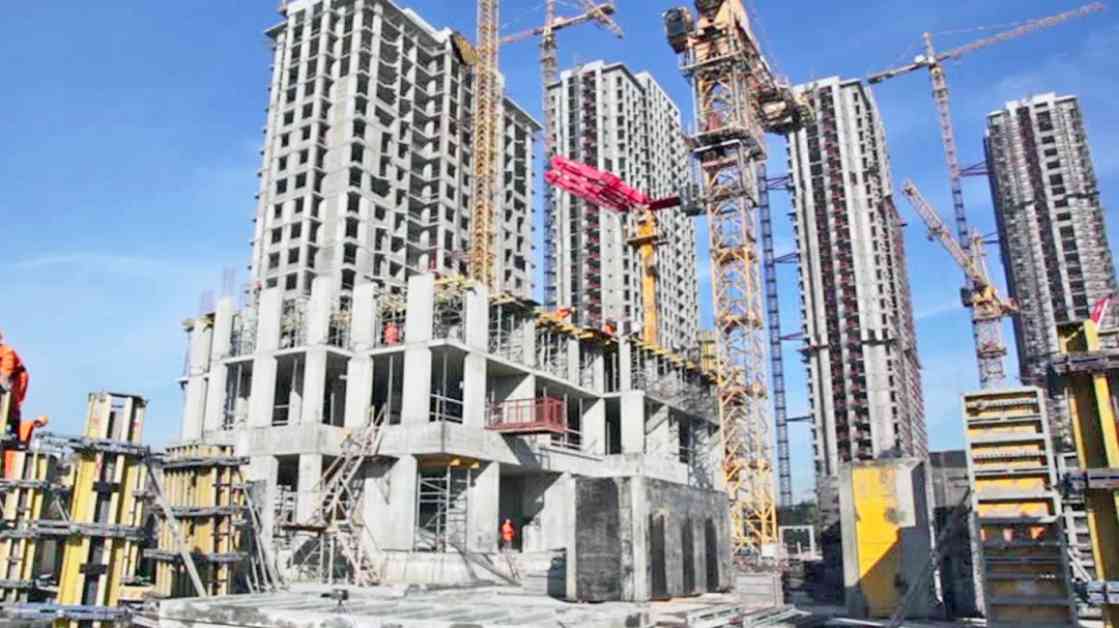Challenges Faced by Under Construction Projects in Mumbai
The real estate sector in Mumbai, often referred to as the financial capital of India, is facing a major crisis with a significant number of under construction projects being stalled. According to a recent analysis by PropEquity, Mumbai has the highest number of stalled projects among all cities in India, with a staggering 234 projects facing delays. This has not only impacted the real estate developers but has also left homebuyers in a state of uncertainty.
The freeze in development has affected over 5,00,000 housing units across the country, with completion timelines being pushed back by three to four years in many cases. This delay has caused a ripple effect in the real estate market, leading to a decrease in investor confidence and a slowdown in new project launches. The reasons behind the stalled projects in Mumbai are varied and complex, with several factors contributing to the crisis.
Factors Contributing to Stalled Projects in Mumbai
One of the primary reasons for the stalled projects in Mumbai is the lack of funds. Real estate developers often rely on bank loans and advances from homebuyers to finance their projects. However, with a slowdown in sales and a liquidity crunch in the market, many developers are finding it challenging to secure the necessary funds to complete their projects. This has led to a situation where construction work has come to a standstill, leaving homebuyers in limbo.
Another factor contributing to the stalled projects is the regulatory environment in Mumbai. The real estate sector in India is highly regulated, with multiple approvals required from various government bodies before a project can commence. Delays in obtaining these approvals, coupled with bureaucratic red tape, have become a significant roadblock for developers in Mumbai. This has resulted in projects being stuck in the planning stage for years, with no progress on the ground.
Additionally, the economic slowdown in the country has had a major impact on the real estate sector, including in Mumbai. With job losses, salary cuts, and uncertainty in the market, homebuyers are hesitant to invest in new projects, leading to a decrease in demand for housing units. This has further exacerbated the situation for developers, who are struggling to sell their existing inventory and generate revenue to complete their stalled projects.
Impact on Homebuyers and Real Estate Developers
The stalled projects in Mumbai have had a significant impact on both homebuyers and real estate developers. Homebuyers who have invested their hard-earned money in these projects are left in a state of uncertainty, unsure of when they will receive possession of their homes. Many are paying hefty EMIs on their home loans without the assurance of actually owning a property anytime soon.
On the other hand, real estate developers are facing mounting pressure from lenders, investors, and regulatory authorities to complete their projects. The delays in construction have not only led to cost overruns but have also tarnished the reputation of developers in the market. Many developers are now finding it challenging to attract new investors or secure funding for future projects, further exacerbating the crisis in the real estate sector.
Way Forward for Under Construction Projects in Mumbai
In order to address the crisis of stalled projects in Mumbai, it is essential for all stakeholders, including developers, government authorities, and homebuyers, to come together and find a viable solution. One of the key steps that can be taken is to streamline the approval process for real estate projects, making it more efficient and transparent. This will help in reducing the time taken to obtain necessary clearances and permits, allowing developers to start construction work sooner.
Furthermore, the government can play a crucial role in providing financial support to developers who are struggling to complete their projects. This can be done through initiatives such as the creation of a stress fund for the real estate sector or by offering tax incentives and subsidies to developers facing funding challenges. By providing the necessary financial assistance, the government can help in reviving the stalled projects and boosting the overall real estate market in Mumbai.
It is also essential for developers to adopt a more customer-centric approach and communicate transparently with homebuyers about the progress of their projects. By keeping the buyers informed about the status of construction and providing realistic timelines for completion, developers can build trust and confidence among their customers. This will help in restoring faith in the real estate sector and attracting new buyers to invest in under-construction projects.
In conclusion, the crisis of stalled projects in Mumbai is a complex issue that requires a multi-faceted approach to resolve. By addressing the root causes of the problem, streamlining the approval process, providing financial support to developers, and fostering transparency in the sector, stakeholders can work together to revive the real estate market in Mumbai and ensure that under construction projects are completed in a timely manner.




















